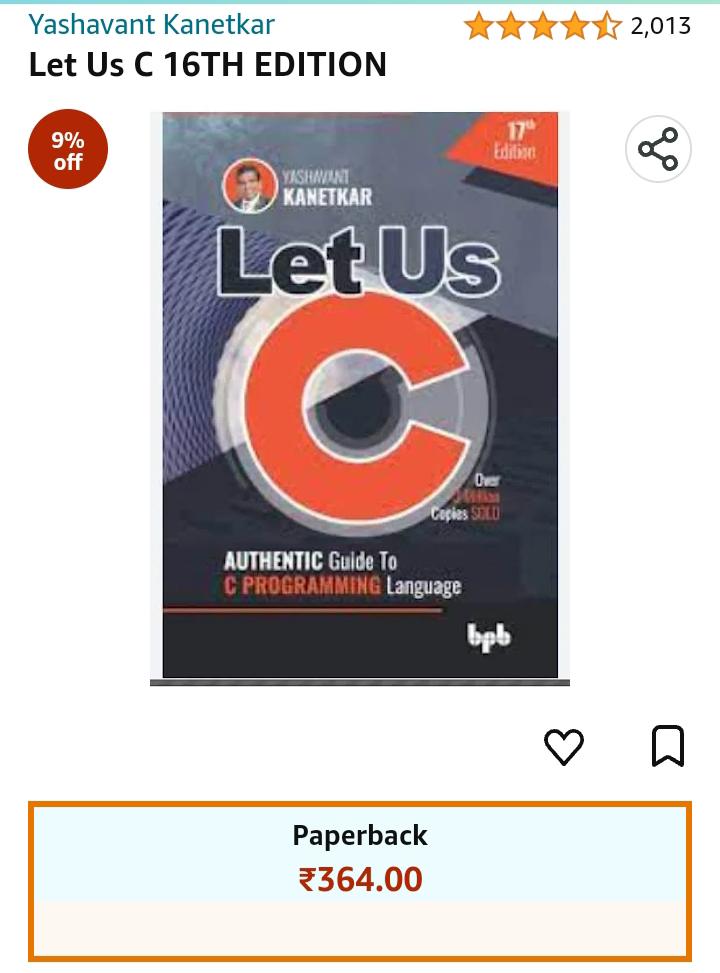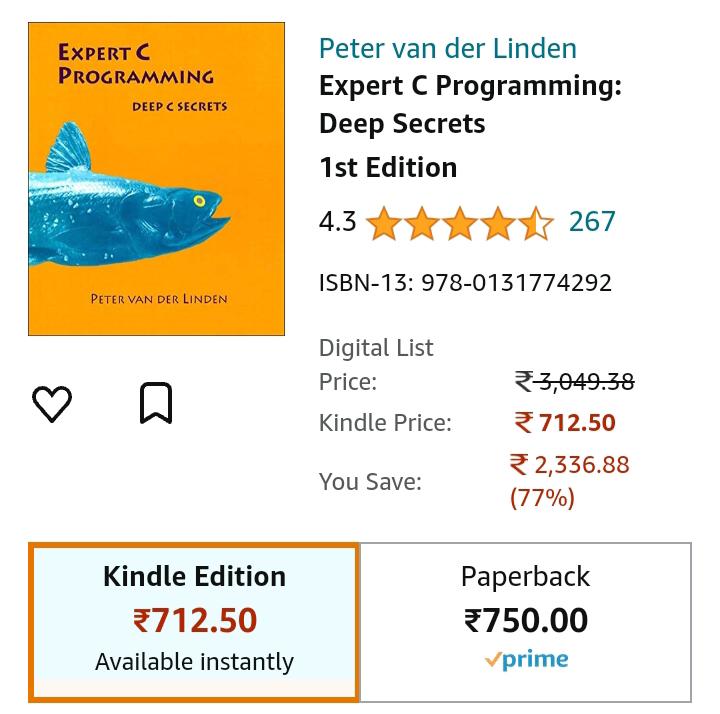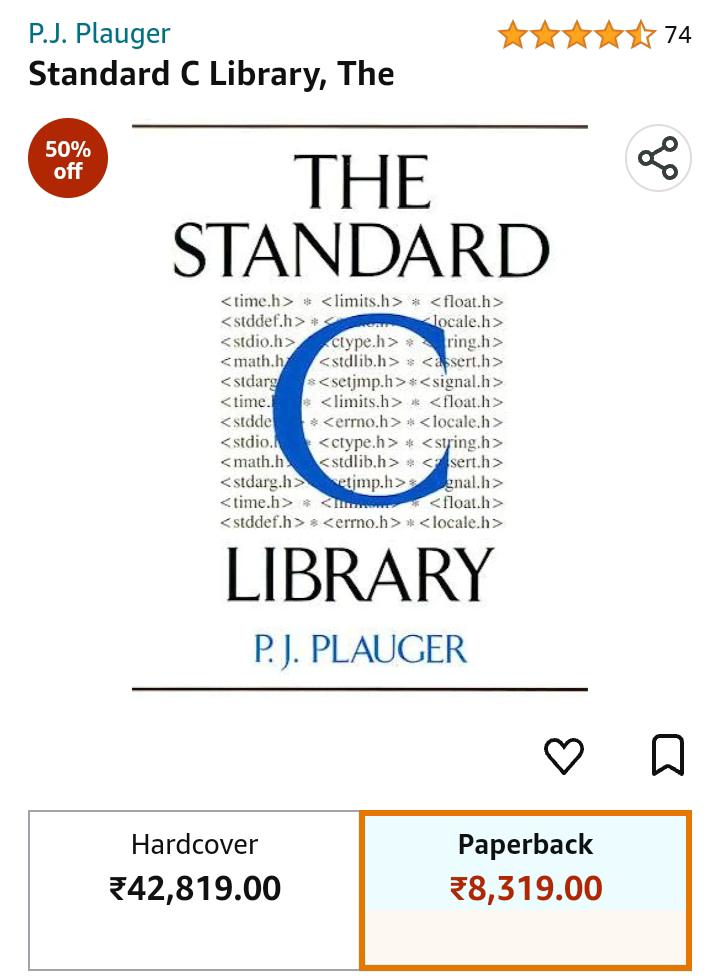10 Must-Read C Programming Books of All Time
This list of the top C programming books has been curated from several prestigious publications in computing literature, discussions on C programming communities across Reddit, Y Combinator, and bestsellers on Amazon India. You are absolutely in the right place, if you find the same old recommendations everywhere else and want to explore both popular and overlooked gems.
So, here are the top 10 C programming books you will ever need to learn and use the language to your advantage. From classics and bestsellers to modern interpretations with insightful tips, the texts here have stood the test of time and continue to inspire and educate all C programmers and developers at every stage of their learning and implementation.
1. The C Programming Language by Brian Kernighan and Dennis Ritchie
Co-authored by the C programming language creator, this book deserves this top listing. Getting the second edition that follows the American National Standards Institute (ANSI) is recommended.
This C language book, popularly abbreviated to K&R C, immediately starts with a tutorial. It is expected the reader knows a little about programming basics before reading it. The rest of it goes into providing example-based learning on the important topics – operators, expression, standard library, etc.
Best-suited C / C++ courses for you
Learn C / C++ with these high-rated online courses
2. Let Us C by Yashavant Kanetkar
This is the go-to book for Indian college students in Computer Science for theory and practical exams. It still remains one of the most accessible C language books in the country due to the simplicity of explaining the main C language concepts.
The end of each chapter will lead to exercises that will certainly get you to explain concepts clearly in your next programming interview. You will learn about debugging and much more over here. But the main reason to read this book is that it covers the basics and gradually moves into higher and more complex concepts in the most logical manner.
3. Programming in ASCI C, 8th Edition by E Balaguruswamy
Another Indian crowd favourite, this C programming book is for beginners that ranks 7th in Amazon’s Programming Language Books category. The chapters are aligned with the AICTE curriculum. There are about 24 case studies, fully detailed, and many follow-up exercises to reinforce your learning.
While this C language book should be your main guide as a beginner, you will enjoy the two included projects. One is on Electricity Board Management System
and the other is on Making Web Services in C.
4. Expert C Programming: Deep C Secrets by Peter van der Linden
Just like the name suggests, this book provides some advanced tips and stories from experts. There are quick tips for those who have been working on C programming for some time. They can learn from the insights and real stories of the more experienced C programmers.
For instance, it discusses common mistakes beginners make. One is the confusion between the assignment operator (=) and the equality operator (==).
5. C: A Reference Manual by Samuel P. Harbison III and Guy L. Steele Jr.
This is one of the best C language books you can use as your go-to manual when you have some basics covered on programming.
The approach the authors take is bottom-up. Meaning, you will first come across the lower-level components like lexical structure (capital and small letters, digits) to higher-level components, including run-time libraries.
This is a detailed manual, so you can learn the C language standards – C89, C99, and C11. It highlights the changes and enhancements introduced in each version.
This book should not be considered a tutorial book but one to learn the nuances of the language.
6. C Interfaces and Implementations: Techniques for Creating Reusable Software by David Hanson
Software engineers highly regard this C language book. If you are one, you will enjoy how the book teaches you to create reusable APIs easily because C is low-level language and it is hard to use it through linguistic understanding.
You will learn how to use an interface-based design – a methodology that is language-independent. The book will take you through 24 interfaces (APIs) and 8 sample applications.
Each chapter here has tests you can do after understanding the simple explanations. The book is for experienced computer programmers.
7. 21st Century C: Tips from the New School by Ben Klemens
The author boasts anyone new to C language or relearning it after years will find this book useful.
One of the key takeaways from the book is the importance of leveraging libraries. Klemens mentions in an interview that if one lacks knowledge in linking to a binary tree library, they will have no choice but to develop their own binary tree implementation.
According to the author, many individuals who believe that all aspects of C programming must be built from scratch may simply be unaware of how to integrate their code with the wide range of available libraries.
This C programming book also covers setting up a C programming environment, using Autotools (C’s de facto cross-platform package manager), and discusses which older C concepts should be deprecated.
In short, if you have learnt C the traditional way, there are many modern challenges you will encounter. This book will unclog those challenges and make look C easier.
8. Beej’s Guide to C Programming by Brian “Beej Jorgensen” Hall
It is a comprehensive, open-source e-book on the C language that beginners should read. The teaching approach is slightly more modern than the classic from Brian Kernighan and Dennis Ritchie mentioned today.
Still, it covers a lot of basics in an easy–to-understand manner. You can read on operators, type specifiers, functions, integer conversions, etc.
As many programmers have mentioned, the book helps you acquire the skills to effectively structure meaningful statements to obtain valuable output instead of error messages during the compilation and execution of your code.
Further, it provides detailed information on the necessary data types for the C language and how to properly represent them.
9. Modern C by Jens Gustedt
Authored by a senior scientist at the French National Institute for Computer Science and Control (INRIA) and co-editor of the ISO C standard, the book is a must-have in every C programmer’s arsenal.
The author takes into account the background of when C was standardised through ISO from 1989 to 2018. The book takes on from C17, the new set of standards. The author also advises that one has to know programming, including Python, MATLAB, and JavaScript.
The book is not exactly a linear read but you will go through 4 levels. It starts from 0 which refers to ‘Encounter’, 1 for ‘Acquaintance’, 2 for ‘Cognition’, and 3 for ‘Experience’. The lower level is basic and gradually moves up into detailed but specific topics.
10. The Standard C Library
This book should be read along with K&R C, especially for those who are working on larger projects. It comes with a huge collection of codes that are reusable.
The coverage in this book with regards to concepts, design issues, and trade-offs is substantial. It is highly recommended to all C programmers because the book will help understand the trade-offs between various design choices, consider performance implications, and ensure compatibility and reusability.
Parting Thoughts
Hope these C language books are able to help you at any stage of your learning path. Ideally, they will be handy when you read any of them along with your C programming courses.
Further Reading

Aquib is a seasoned wordsmith, having penned countless blogs for Indian and international brands. These days, he's all about digital marketing and core management subjects - not to mention his unwavering commitment ... Read Full Bio











Comments
(1)
J
11 months ago
Report
Reply to JokeCity FunUnlimited